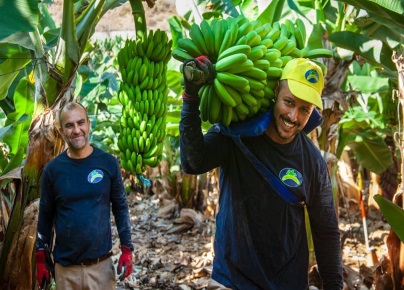Plátano de Canarias prices affected by imported bananas
2024-03-22

In 2023, the Canary Islands' banana industry reached a historic high, with island producers marketing a record 440,000 tons. However, this achievement is overshadowed by challenges, primarily competition from imported bananas. According to Asprocan, the Association of Organizations of Banana Producers of the Canary Islands, these imports compete under more favourable rules and act as a distribution brand, driving prices down.
The high temperatures of 2023, 1.5 degrees higher than in 2022, boosted production. The banana, which requires heat to ripen, is ripening at an increasingly faster rate due to the tropicalization of the Canary climate. This accelerated production led to a 35% increase over the previous year. However, escalating costs and collapsing prices have led the sector to a critical situation in terms of economic viability, warns Asprocan.
Last year's total market value was 1,347 million euros, with 900 million corresponding to Canary Island bananas and the remaining 447 million to banana imports. Canary Island producers sold at an average price of 0.83 euros per kilo, while the final consumer paid around 2.11 euros per kilo. In contrast, although the wholesale price of bananas was similar (0.81 euros), 1.41 euros were passed on to the consumer. Despite this, the banana/banana share ratio remained at 60%/40% in Spain, thanks to promotional actions by Canary Island producers, who managed to increase their category's consumption volume by 12% and avoid a definitive crisis.
"Fortunately, the Plátano de Canarias has a high consumer preference for its quality, and therefore its price to the public responds to an application of much higher margins in distribution than those applied to imports from third countries that compete with us, which, in fact, in most cases are sold without margin or even at a loss at the point of sale," says Sergio Cáceres, manager of Asprocan.
He insists that "selling 58% of the volume, the Plátano de Canarias contributes more than 70% of the value of the banana-banana category in distribution, indicating the disproportionate margins applied to one and the other product."
Canary producers denounce that "the imported banana acts as a distribution brand, collapsing the wholesale price, the lowest in the European Union while benefiting from a policy of margins in distribution that prevents a higher turnover of bananas to consumers. The main problem is that importers are not required to comply with the same environmental requirements and labour standards imposed on EU producers, which is behind the increase in many of the costs associated with the management and operation of banana plantations. "We play in the same league but with different rules," says Esther Dominguez, technical director of Asprocan.
"We apply much higher costs because we have labour, environmental, and safety standards that are not required for imports. Suppose there is no equality in the market because there are other priorities in the global market. In that case, this imbalance must be remunerated because, in the current situation, the production costs are unaffordable.
We cannot accept a slow death," says Cáceres. The solution would be the introduction of the so-called' mirror clauses' in trade agreements; however, the most interested countries, among which are Spain, France, Italy, and Portugal, do not have the qualified majority in the EU to bring them forward.
Cáceres qualifies, however, that although many of the sector's needs depend on decisions that affect the European single market, "complementary actions must be taken at the national level".
"There is no panacea, but, for example, the consumption of fruit and vegetables in Spain has been reduced by more than 20% in the last 10 years. When the market that we farmers serve is at those levels of decline, the supply is placed in every man for himself because the pie is getting smaller," he concludes. In his opinion, "policies and campaigns to recover the demand for fruit in our country would also help to recover profitability."









